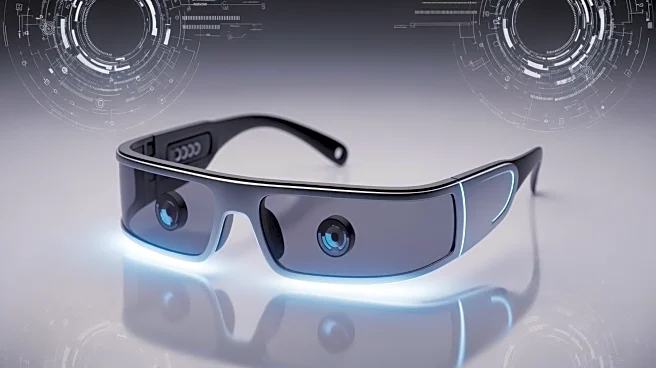What's Happening?
Snapchat is set to release its first consumer augmented reality glasses, known as 'Specs,' in 2026. This development is part of a broader trend in the augmented reality market, where companies are increasingly pushing wearables into the territory traditionally
occupied by smartphones. The announcement comes amidst a competitive landscape, with Meta and EssilorLuxottica also making significant moves in the AR space. Snap's focus on lightweight, social-first AR glasses aims to attract younger buyers, particularly those interested in filters and camera functionalities. The Specs are expected to be a cost-effective entry point into the AR market, potentially challenging existing players like Meta, which recently launched its second-generation Ray-Ban Meta glasses.
Why It's Important?
The introduction of Snap's consumer Specs is significant as it positions the company as a key player in the rapidly evolving augmented reality market. This move could intensify competition with established brands like Meta and EssilorLuxottica, potentially leading to more innovation and lower prices for consumers. The focus on social-first features aligns with Snapchat's core user base, which could drive adoption among younger demographics. Additionally, the expansion into AR wearables reflects a broader industry trend towards integrating technology into everyday life, offering new opportunities for app developers and content creators to explore augmented reality experiences.
What's Next?
As Snap prepares for the 2026 launch of its Specs, the company may face increased scrutiny from competitors and investors. The success of these AR glasses will likely depend on their ability to deliver unique features that resonate with consumers. Meanwhile, other companies in the AR space, such as Meta, are expected to continue developing higher-end display glasses, potentially leading to a shift from novelty frames to functional AR overlays. The market dynamics could also prompt regulatory discussions around privacy and data security, especially with the emergence of 'always-on' AI glasses that raise surveillance concerns.
Beyond the Headlines
The development of consumer AR glasses by Snap and other companies could have long-term implications for privacy and social norms. As AR technology becomes more integrated into daily life, questions about data collection and user consent are likely to arise. The potential for AR glasses to record and augment conversations may lead to new regulatory challenges and ethical debates. Additionally, the shift towards wearable technology could influence cultural perceptions of personal space and interaction, as augmented reality becomes a more common aspect of social engagement.

















